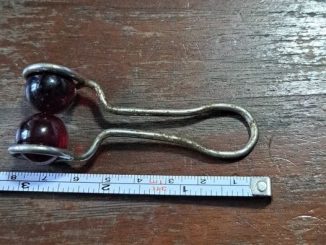In a world where traditional relationships and marriage are often viewed as life milestones, Antoine Cheval, a French man, has taken a bold and unconventional step by marrying himself. After experiencing numerous failed relationships and repeated rejections to his marriage proposals, Antoine, who identifies as a “sologamist,” chose to commit to the most important relationship in his life: the one with himself.
Who is Antoine Cheval?

Antoine Cheval is a French individual who, following years of personal challenges and heartbreak, made the radical decision to marry himself. His embrace of sologamy—also known as autogamy—emerged as a response to repeated romantic disappointments. By choosing to marry himself, Antoine made a profound statement about self-love and personal worth. His self-marriage ceremony included all the traditional trappings: vows, a reception, and guests, symbolizing his commitment to living authentically and on his own terms.
Antoine’s journey is part of a broader trend where people around the world are exploring self-marriage as a way to affirm their independence, self-worth, and emotional fulfillment. He sees his act not just as personal, but as a challenge to societal norms surrounding love and relationships.
What is Sologamy?
Sologamy, or self-marriage, is the act of committing to oneself in a ceremony that symbolizes self-love and independence. While it lacks the legal standing of traditional marriage, sologamy is a symbolic gesture that underscores a person’s dedication to their own happiness and well-being. Practitioners of sologamy often view it as a celebration of self-empowerment and a way to prioritize their personal growth.

Critics argue that self-marriage is purely symbolic and does not confer the legal or social benefits of traditional marriage. Supporters, however, see it as a powerful affirmation of self-worth and a rejection of societal pressures to find validation through others. For many, marrying oneself represents a commitment to personal happiness, emotional health, and independence.
Self-Marriage Celebrations
Self-marriage ceremonies often mirror traditional weddings, complete with vows, guests, a reception, and even a wedding cake. Some individuals also undergo counseling or personal reflection to prepare for the emotional commitment of marrying themselves. These ceremonies provide an opportunity to reflect on past relationships, embrace self-love, and move forward with confidence.
While often associated with affluent women in the 21st century, sologamy is not limited to one gender or demographic. People from various backgrounds have embraced the practice, viewing it as a way to prioritize self-care and redefine what it means to be fulfilled.
Notable Examples of Sologamy

Antoine Cheval is not the only person to make headlines for marrying himself. In 2014, British photographer Sophie Tanner celebrated her self-marriage with a ceremony attended by friends and family. Tanner explained that she wanted to honor herself as an independent woman, free from societal expectations.
In 2017, Italian fitness trainer Laura M married herself following a divorce, citing the act as a means of reclaiming her identity and empowerment. Her ceremony included traditional wedding elements, symbolizing a fresh start and a renewed commitment to herself.
In 2022, Kshama Bindu, a woman from Gujarat, India, became the country’s first known sologamist. She married herself in a traditional Hindu ceremony, complete with cultural rituals, after deciding she didn’t need a partner to experience the joy of being a bride. Bindu, who identifies as bisexual, described her self-marriage as an act of self-love and a challenge to societal norms.
Self-Love and Personal Empowerment
The rise of sologamy challenges conventional ideas of love and relationships by emphasizing self-acceptance, independence, and emotional resilience. While not everyone may embrace the concept of self-marriage, it highlights the importance of cultivating a healthy relationship with oneself. By marrying themselves, individuals like Antoine Cheval demonstrate that love doesn’t always have to come from a partner—it can come from within.
Antoine’s story, along with those of others who have embraced sologamy, serves as a reminder that self-love is foundational to personal happiness. Their actions encourage a broader dialogue about the value of prioritizing oneself and finding fulfillment independent of societal expectations.
So, whether or not sologamy resonates with you, it offers an important lesson: loving and valuing yourself can lead to greater empowerment, happiness, and emotional well-being.
“To Antoine Cheval and everyone who dares to put themselves first—may your stories inspire others to embrace their worth, celebrate who they are, and live authentically.” 💍❤️
Women are 100% sure they understand the problem
Friend groups evolve over time, especially when it comes to relationships. Loneliness, love, and companionship are part of life’s natural cycle. In this scenario, a group of five friends starts the year feeling lonely, but by the end of the year, three of them are in relationships, leaving only two still searching for love. This shift raises an interesting question: do women truly understand the dynamics of loneliness and relationships better than men?

Why Women Believe They Fully Understand Relationship Dynamics
It’s no secret that women often express strong confidence when analyzing relationship patterns, predicting outcomes, and offering advice. But why?
1. Emotional Intelligence and Social Awareness
Women, on average, tend to have higher emotional intelligence (EQ) than men. Studies show that women are better at recognizing emotions, empathizing, and analyzing social situations. This heightened awareness gives them a strong sense of understanding when it comes to relationships.
Think about it—who usually plays the role of the go-to advisor in friend groups? More often than not, it’s a woman who can dissect a situation with pinpoint accuracy.
2. Observational Skills and Pattern Recognition
Women are excellent at noticing patterns in behavior. They can often predict relationship trends based on subtle changes in communication, body language, and emotional cues. When three of the five friends enter relationships within a year, women might argue that they “saw it coming” based on their observations.
3. Communication and Emotional Expression
Men and women communicate differently. Women are generally more open about their emotions, allowing them to discuss and analyze relationship problems with greater depth. This continuous dialogue creates a sense of certainty in their understanding.
The Role of Social Influence in Relationships
Social dynamics play a huge role in whether someone finds a partner. In many cases, people don’t enter relationships purely because of love—they do so due to social influence, timing, and peer pressure.
1. The “Relationship Domino Effect”
Once a few friends in a group start dating, it often encourages others to do the same. People naturally gravitate toward behaviors that seem socially acceptable and beneficial. If three out of five friends find partners, the remaining two may feel pressured to do the same.
2. Shifting Priorities in Friendships
As friends enter relationships, priorities shift. Time once spent together is now divided between partners and friendships, making single friends feel lonelier. This social restructuring can make it seem like loneliness is increasing for those who remain single.
The Psychology of Loneliness vs. Companionship
Loneliness isn’t just about being single—it’s about the perception of isolation. Someone can be in a relationship and still feel lonely if they lack emotional connection.
1. Why Some People Stay Single
Despite social pressure, not everyone enters a relationship at the same pace. Some people prioritize career growth, personal goals, or simply haven’t found the right match. The two remaining single friends may not be lonely by choice but are waiting for a meaningful connection.
2. The Illusion of “Fixing” Loneliness Through Relationships
Many believe that finding a partner automatically solves loneliness. However, emotional fulfillment doesn’t always come from a romantic relationship. True emotional well-being stems from self-confidence, friendships, and a strong sense of purpose.
Do Women Have a Better Understanding of Relationship Dynamics?

While women may feel certain they understand the emotional shifts happening in their friend group, confidence doesn’t always equal accuracy. However, their strengths in emotional intelligence, communication, and social awareness allow them to grasp relationship dynamics more quickly.
But here’s the catch—relationship experiences vary. No two people go through the same emotional journey, making it impossible to have a one-size-fits-all understanding.
Final Thoughts: The Ever-Changing Landscape of Love and Loneliness
Friendships, relationships, and loneliness evolve over time. The story of five friends, three finding love, and two remaining single is a classic example of how social dynamics shift within a year. Women might feel they fully understand the reasons behind these changes, but love and relationships are unpredictable.
Ultimately, whether single or in a relationship, the most important factor is personal happiness. Understanding emotions, recognizing patterns, and maintaining strong friendships are key to navigating the ever-changing world of relationships.



Leave a Reply